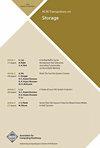从失误到里程碑:实用故障慢速检测之旅
IF 2.6
3区 计算机科学
Q3 COMPUTER SCIENCE, HARDWARE & ARCHITECTURE
引用次数: 0
摘要
新出现的“慢速故障”困扰着软件和硬件,其中受害组件仍在运行,但性能下降。为了解决这个问题,本文介绍了Perseus,这是一个实用的存储设备慢速故障检测框架。Perseus利用基于轻回归的模型来快速定位和分析驱动器粒度的故障慢速故障。在对248K硬盘进行了10个月的密切监测后,Perseus发现了304个慢速故障。隔离它们可以将(节点级)99.99次尾延迟减少48%。我们从生产轨迹中组装了一个大规模的故障慢速数据集(包括41K正常驱动器和315个经过验证的故障慢速驱动器),在此基础上,我们提供了故障慢速驱动器的根本原因分析,涵盖了各种执行不良的调度、硬件缺陷和环境因素。我们已经向公众发布了数据集,以供慢速研究。本文章由计算机程序翻译,如有差异,请以英文原文为准。
From Missteps to Milestones: A Journey to Practical Fail-Slow Detection
The newly emerging “fail-slow” failures plague both software and hardware where the victim components are still functioning yet with degraded performance. To address this problem, this article presents Perseus , a practical fail-slow detection framework for storage devices. Perseus leverages a light regression-based model to quickly pinpoint and analyze fail-slow failures at the granularity of drives. Within a 10-month close monitoring on 248K drives, Perseus managed to find 304 fail-slow cases. Isolating them can reduce the (node-level) 99.99th tail latency by 48%. We assemble a large-scale fail-slow dataset (including 41K normal drives and 315 verified fail-slow drives) from our production traces, based on which we provide root cause analysis on fail-slow drives covering a variety of ill-implemented scheduling, hardware defects, and environmental factors. We have released the dataset to the public for fail-slow study.
求助全文
通过发布文献求助,成功后即可免费获取论文全文。
去求助
来源期刊

ACM Transactions on Storage
COMPUTER SCIENCE, HARDWARE & ARCHITECTURE-COMPUTER SCIENCE, SOFTWARE ENGINEERING
CiteScore
4.20
自引率
5.90%
发文量
33
审稿时长
>12 weeks
期刊介绍:
The ACM Transactions on Storage (TOS) is a new journal with an intent to publish original archival papers in the area of storage and closely related disciplines. Articles that appear in TOS will tend either to present new techniques and concepts or to report novel experiences and experiments with practical systems. Storage is a broad and multidisciplinary area that comprises of network protocols, resource management, data backup, replication, recovery, devices, security, and theory of data coding, densities, and low-power. Potential synergies among these fields are expected to open up new research directions.
 求助内容:
求助内容: 应助结果提醒方式:
应助结果提醒方式:


